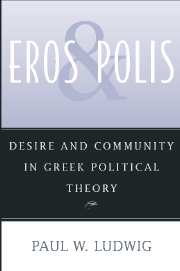Introduction
Published online by Cambridge University Press: 10 December 2009
Summary
A recurrent feature of ancient Greek political discourse was the assertion that erotic passion was a causal factor in the emergence and maintenance, as well as the decline, of the Greek polis. Eros, the most private of passions, was believed by ancient political thinkers to be of the utmost public relevance. For them, the term eros included the ordinary meanings of love and sexuality but went beyond these to embrace a wide array of inclinations comprising ambition, patriotism, and other aspirations that were properly political in nature. Not only the soulcraft of Platonic philosophy but also Thucydides' hard-headed and purely political account of the Peloponnesian War makes use of erotic terminology to describe ambition, including, for example, a citizen's ambition to serve the state, a community's ambition to liberate itself from bondage, and an imperial power's ambition to attempt a foreign conquest. The modern reader must question the accuracy of these descriptions, asking, in particular, how closely the concept of eros in ancient psychology resembles our own experience of eros and how instructive the comparison between political passion and eros is, after the differences between ancient and modern concepts of eros have been taken into account.
In classical Athens, the discourse of political eros was both a rhetoric and a theory. The large semantic field of the Greek word eros, comprising political and other meanings, had been a linguistic feature of long standing.
- Type
- Chapter
- Information
- Eros and PolisDesire and Community in Greek Political Theory, pp. 1 - 24Publisher: Cambridge University PressPrint publication year: 2002

